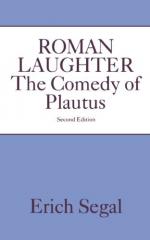|
This section contains 15,351 words (approx. 52 pages at 300 words per page) |

|
SOURCE: Erich Segal, in Roman Laughter, Harvard University Press, 1968, 229 p.
In the following excerpts from his book-length study of Plautus's comedies, Segal sketches Plautus's career as a professional playwright popular with Roman audiences and explores the relationship between Plautine Roman comedy and the Roman holiday mentality.
Introduction
Of all the Greek and Roman playwrights, Titus Maccius Plautus is the least admired and the most imitated. "Serious" scholars find him insignificant, while serious writers find him indispensable. He deserves our careful attention, not merely because his twenty complete comedies constitute the largest extant corpus of classical dramatic literature (more plays than Euripides, nearly twice as many comedies as Aristophanes, more than three times as many as Terence), but because, without any doubt, Plautus was the most successful comic poet in the ancient world. We know of no setback in his artistic career comparable to Aristophanes' frustrations with the Clouds...
|
This section contains 15,351 words (approx. 52 pages at 300 words per page) |

|


